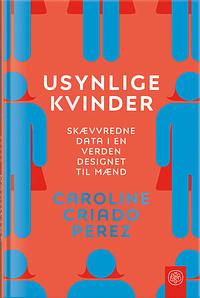Take a photo of a barcode or cover
challenging
informative
fast-paced
Informative but sad reality women live.
Very dense, reads like a textbook. Would make for a better podcast or audiobook.
3.5. It took me what felt like a millennium to finish this book. It was a hard read but I think that’s kind of inevitable with a book like this which is essentially a compilation of data and statistics. I feel like I learned a little bit about a massive range of subjects in this book, and having this (science and data backed) picture painted of why you experience the world the way you do is extremely validating. I also enjoyed that it included stories of women from all over the world, and emphasized how and why low income women suffer the most at the hands of the world’s male-default design. One critique is that the failure to distinguish sex from gender and the lack of inclusion of LGBTQ+ women in a book so thorough (and published in 2019) seems offensively deliberate. I found that really strange. All in all, this book made me look at the world through a different lens. And also really pissed me off. I would recommend it.
informative
slow-paced
dark
informative
reflective
medium-paced
I read this book for my work's bookclub. This book was very educational and did a good job highlighting the widespread data that excludes women—and in many instances, inadvertently (or intentionally) causes harm to them. The author did an excellent job of pulling on available statistics as well as extrapolating information from the data gaps. The chapter on GDP was particularly interesting and insightful to me, and I felt the author did an excellent job explaining how women's paid vs. unpaid labor directly influences the national and global economy. That being said, there were some chapters where the author called attention to data gaps, and in order to draw conclusions, relied on gender essentialism or gender essentialist-adjacent concepts that did not always sit right with me. Overall, though, I appreciated that the book was very thorough in criticizing the "male default " and explaining how harmful it is to exclude women from the research we do and the data we collect. I think it's a great starting point for learning about the inherent—and often invisible—ways that the patriarchy influences every aspect of our lives.
Moderate: Misogyny, Rape, Sexism, Sexual assault, Sexual violence, Stalking, Pregnancy, Sexual harassment
challenging
informative
fast-paced
informative
reflective
slow-paced
dark
informative
sad
medium-paced
Women's right are human rights and it sucks that that has to be said. We are only hypervisible when it comes sex but invisible in the extra carework that is often forced upon us because no man is going to do it and we are expected to do it and shut up. It is not very often that I have such a physical and emotional reaction to a book but being fed stat after stat about how the world and people are designed against me as a women due to ignorance or lack of care made me furious and actually have to leave at multiple points. I think that although perez tried to create a positive swing at the end of the book it was not very effective due to the negative realities and horror of how the gender data gap and being a women forced to exist in this current society affects myself and my loved ones. It did help and explain a lot about why I react in negative ways to certain environments, and gave me reason to identify that my reactions are justified because its often a design flaw of my surrounds that is making my world generally more unsafe for me. Honestly the problem seems to always stem back to men (I don't mean to be a man hater) but I do hate the fact that they are often so privileged and unaware of any reality but their own. I shared some of my thoughts with my male friends and their reactions was just "oh damn that sucks I never thought of that" while I have been living with that awareness and stress that these they will never experience or have to worry about. No wonder I'm a fucking lesbian that naturally dislikes, distrusts and find men annoying. I got tired of doing the carework for them from a young age and think the ultimate horror of existence would be coexistence with a man as I've spent years cleaning up after them, dealing with their emotional immaturity, and harassment. It's a good informative book but will hurt me more then my period ever will and stick with me for longer.
This book is an eye-opening account of what happens when women are not considered in virtually all aspects of life. As a woman, I thought I was aware of the injustices and of the priviliges I do or do not have - I was wrong.
After finishing this book, I am left with both a feeling of empowerment because I now know more about the issue and I know where to find information - thanks to the amazing research Criado-Perez has conducted -, but also a feeling of helplessness. What to do next? How can I, as a woman, make sure that I am treated fairly (without being „too demanding“ in this male-dominated world)?
After finishing this book, I am left with both a feeling of empowerment because I now know more about the issue and I know where to find information - thanks to the amazing research Criado-Perez has conducted -, but also a feeling of helplessness. What to do next? How can I, as a woman, make sure that I am treated fairly (without being „too demanding“ in this male-dominated world)?
informative
reflective
slow-paced
Just got pretty repetitive and statistic heavy. An important point, but a point that was already made about 10% of the way into the book



